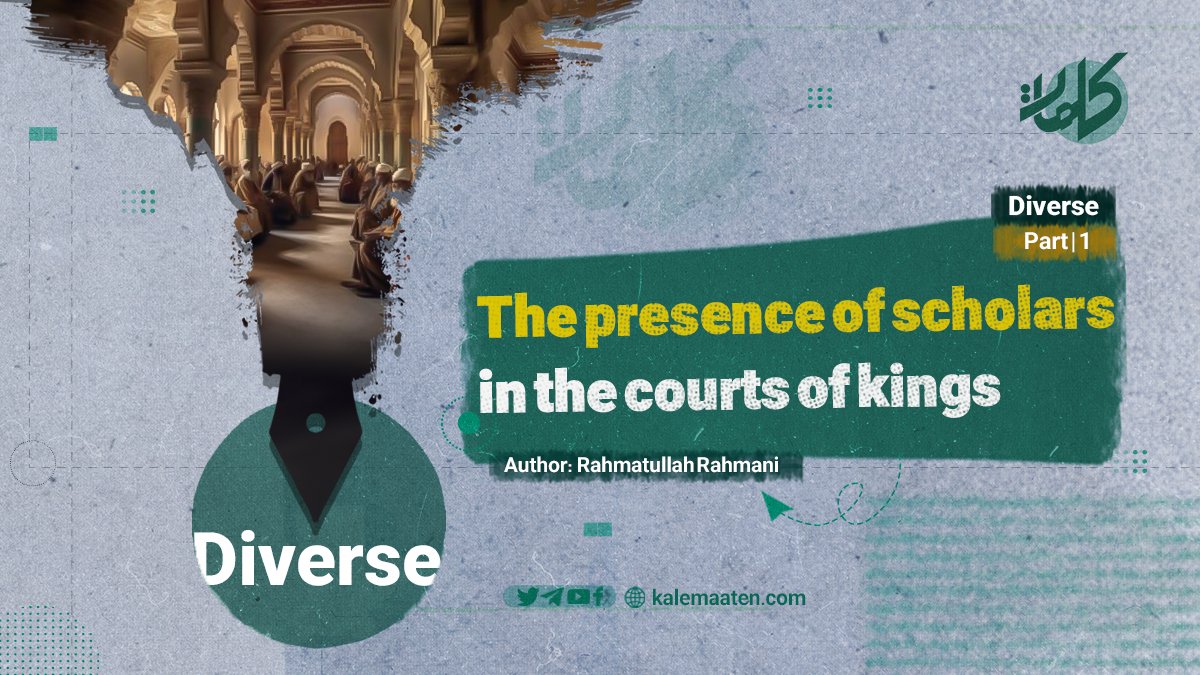
Author: Rahmatullah Rahmani
The Presence of Scholars in the Courts of the Kings (Part One)
Allah Almighty says: «وَإِنَّهُ لَذِكْرٌ لَكَ وَلِقَوْمِكَ وَسَوْفَ تُسْأَلُونَ» (And indeed, the holy Quran is the source of awakening for you and your people, and you will be questioned about this divine program…)
The scholars of the Salaf warned about the dangers posed by scholars and Inviters who go to the courts of kings, seeking to benefit from them and gain their approval. Hazrat Abdullah ibn Mas’ud (may Allah be pleased with him) said: “Tribulations lie dormant in the courts of kings, just as a camel kneels and sleeps. By Allah in whose hands is my soul, you will not be able to take any of their worldly wealth and possessions unless they take some of your religion in return.”
Umarah ibn Abdullah narrated from Hzayfah that he said: “Avoid the courts of kings, which are one of the gateways to sedition.” They asked: “O Abu Abdullah! What does that mean?” He replied: “Because one of you goes to the court of a king, falsely confirming him and praising him in words that do not correspond to his true character.”
Wahb ibn Monabah (may Allah have mercy on him) said: “Accumulating wealth and mingling with kings does not leave any of a person’s good deeds, just as if two hungry and dangerous wolves entered a sheepfold and roamed among the flock until morning; not a single healthy sheep would remain in that flock.”
Ahmash (may Allah have mercy on him) said: “The worst rulers are those who are farthest from the scholars; the worst scholars are those who are closest to the rulers.”
It has been said: “The worst scholar is the one who goes to the courts of the rulers, and the best ruler is the one who is present in the presence of the scholars.”
In some hadiths, stern warnings have been given regarding scholars and court jurists. The Prophet (peace and blessings of Allah be upon him) said in a hadith: “The scholars are the trustees of the Messengers, as long as they do not mix with the rulers and do not seek the world. If they cross these two red lines, they have betrayed the trust of the Messengers; then beware of them.”
In another hadith, it is narrated: “The jurists are the trustees of the Messengers, as long as they do not enter the world and do not follow the rulers. If they are afflicted with these calamities, beware of them.”
Another hadith states: “Woe to my nation because of the evil scholars who sell their knowledge to the rulers of their time for personal gain. May Allah does not make their trade profitable.”
Mahmood Warraq informs scholars and court guests of the unfortunate consequences of visiting rulers and frequently attending the sultans, singing:
“Riding on their horses, they appeared in groups at the Caliph’s court in the morning. They remained there from dawn until night, hoping to attain a position of honor and dignity. When they achieved their wish and their situation improved, and their relatives were pleased with the content of the letter, they again went astray and turned to oppression and ugly behavior. Returning to their terrible ways, they betrayed the Caliph’s covenant. They exchanged trust for treachery and security for filth. They made themselves fat and bloated and considered the burden of trust light. (As a result) the graves of the people became narrower, and their beautiful palaces became wider. Every seemingly polite, knowledgeable, opinionated, and jurist-like person who argues from the hadith and analogy of Abu Hanifa comes with a long and bushy beard, as if he is qualified for the position of judge, but he has not benefited from his knowledge, because he has become a captive to his own world. He has forgotten Allah and taken refuge in the world with worn-out ropes.”
Continues…


